Master Wincenty Kadłubek wrote about the battle in Psie Pole. However, there are many indications that the battle, one of the greatest victories of the Polish army ... was not there!
“As soon as it dawned, light-armed men run forward from both sides, differing in both numbers and courage. They are lining up battle lines against each other. And while the [strength] of the Germans increases their numbers, the more courageous makes the Poles bolder, ”wrote champion Wincenty Kadłubek about the Battle of Psie Pole. But did… it even take place?
What is this war for?
The existence of an independent and strong Piast state was a fact difficult for the rulers of the Holy Roman Empire of the German Nation to accept. The only exception in this matter was the short period of Otto III's rule, which clearly indicated a more partner-like treatment of his neighbor across the Oder . In general, however, the First Reich preferred to see at its eastern borders a vassal dependent on it, who could also be played as a counterbalance in relations with other countries of the region - the Czech Republic and Hungary.
In these efforts to curb the independence of the Piast state, the rulers of Germany most often limited themselves to political efforts. Waging wars was costly and not always brought the expected results - at least in relation to the costs incurred. As a result, swords were not immediately grabbed. But in the summer of 1109, King Henry V was convinced there was no other way out.
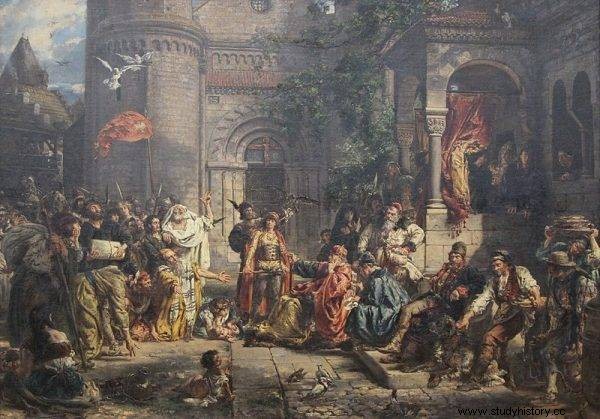
The Piast prince Bolesław III, who had been running an independent hard-handed rule since 1107, became a real problem for the Reich.
Historians are still discussing the reasons for his invasion of Bolesław's state by his descendants called Krzywousty. The ruler of Germany, and without bothering with Eastern affairs, had something to worry about. There was a dispute with the papacy over investiture, the resolution of which, in favor of Henry, required a great deal of commitment. Moreover, as experts on the subject emphasize, Henryk did not have a sufficiently established position in his country. For all the time he had to take into account decentralist tendencies, especially vivid after the period of struggle for power with father Henry IV. On the other hand, the Oder affairs "were of more interest to the Eastern feudal lords of the Reich than to their Western counterparts" - noted historian Mariusz Samp.
Unruly Bolesław
This time it was different. The Piast prince Bolesław III, who led the independent rule of a hard hand from 1107, became a real problem for the Reich. The new ruler intensified vigorous actions (started during the fights with brother Zbigniew for the throne) in order to subordinate Pomerania - areas that had always been the object of interest of German rulers. In addition, he began to conduct an extremely resilient - and effective - policy towards Hungary and Russia, creating a solid political base for his own games on the international arena. This, in turn, allowed him to interfere in the internal affairs of the imperial vassal - the kingdom of Bohemia. And as if that were not enough, in the dispute over investiture, unruly Bolesław supported the papacy.
All this could, in the perspective of , lead to the ditching of the feudal supremacy of the empire by the Piast state and, consequently, to the erosion of the imperial authority in the region . This was too much for the hitherto patient ruler of Germany. It was necessary as soon as possible to cool the hot head of the Polish prince, about whom Gall Anonim wrote that "he was bursting with the thirst for chivalrous fame and military deeds." Henry just needed an excuse.
Great Expedition
This came in the fall of 1108, when Prince Zbigniew, defeated in the fratricidal civil war and expelled from Poland, appeared at Henry's court . The restoration of his co-ordinates (to which he had a strong right because of his seniority) would guarantee the weakening of Bolesław, who was too boldly acting for himself. In addition, the king of Germany badly needed success against the opposing part of the feudal lords. Especially after his unsuccessful trip to Hungary (in which prince Bolesław had his part, of course). In this situation, the exile's efforts to help were met with a friendly reception on the part of Henry.
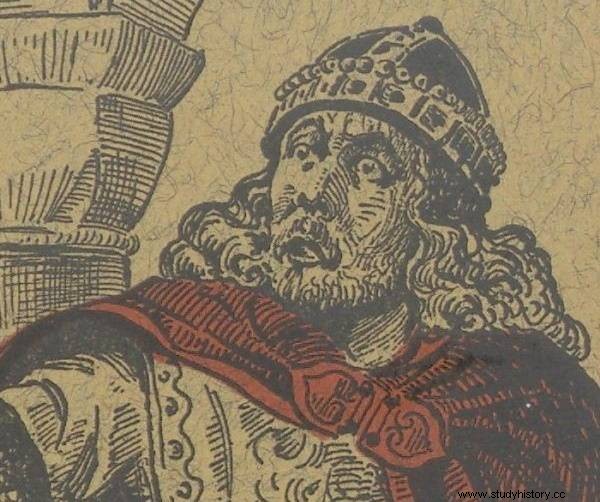
Prince Zbigniew, defeated in the fratricidal civil war and expelled from Poland, appeared at Henryk's court.
After the Piast ruler strongly rejected the demands for Zbigniew to be admitted to the bosom of the dynasty, to give him half of the state and to pay tribute 300 fines, or to transfer as many knights to the royal disposal, the door handle was broken. The time has come for the final decisions. Most likely at the beginning of August 1109, a great expedition of the German knights set off from Erfurt. The historian Karol Olejnik even emphasizes that was probably "expeditio generalis in nature. [of a mass move - ed. aut.], which happened only exceptionally, when the intended expedition was aimed at the realization of the most vital interests of the empire. "
Based on historical sources, researchers estimate that Henryk managed to mobilize up to 10,000. armed , which for those times was of considerable magnitude and indeed testifies to the great determination of the German ruler. Additionally, his forces were to be joined by a contingent of several thousand Czechs. However, they were too late with their march. They showed up only in September near Głogów.
Great disappointment
It was there that Henryk was so successful. Yes, the punitive expedition against the wild Bolesław had every chance of success especially that at the time of the invasion the prince himself was involved in fights with the Pomeranians. However, it soon turned out that had prepared in advance for the eventuality of a German attack. As a result, the knighthood of the Reich had to struggle through the naturally defensive border with few convenient passages. In addition, the encountered fortified castles turned out to be impregnable.
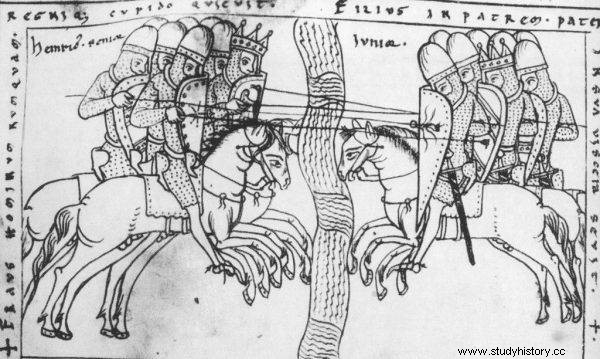
Henryk managed to mobilize up to 10,000 people. armed
In this situation, Henryk was surprised by the surprise of the defenders of Głogów. On August 24, he appeared at its walls. The conquest of the borough turned out to be his only success . The attempts to conquer the town, carried out for about three weeks against the brave resistance of the Głogów inhabitants and the partisan actions of Bolesław, only resulted in losses for Henryk and undermined the authority he needed. As a result, the German ruler collapsed the siege. He moved up the Oder towards Wrocław - the capital of the Silesian province.
The Great Tramp
And this time, the procession of the royal army was not easy. Prince Bolesław, taking advantage of the favorable terrain conditions in the form of dense forests and swamps, constantly tugged at the German troops. He himself, having much weaker forces (historians estimate them at 3-4,000 knights who could be deployed on the Silesian battle front), knew perfectly well that he would not be able to cope with the German-Czech army.
For this the prince's guerrilla warfare and retaliatory attacks by the ruthlessly plundered local population had to hit Henry hard . Even before he arrived at the walls of Wrocław, he made a postulate to Bolesław that he would give up further hostilities for the price of 300 tribute fines. (As historians suspect, Henryk's main goal was to reach Krakow). In the face of the Polish prince's resolute refusal, Henryk "approached the city of Wrocław, where he gained nothing more than [only] corpses to replace the living", wrote Gall Anonim.
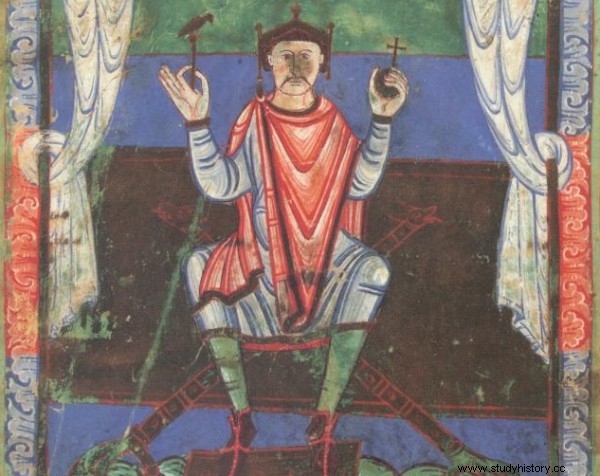
Attempts to capture Głogów brought only losses to Henryk and undermined the authority he needed.
Disputes continue to this day as to whether the king undertook a regular siege of the Silesian capital, or, bearing in mind the Głogów experience, he forgave himself for storming the probably huge fortifications of Wrocław. Suffice it to say that Henryk "[...] pretending that he was going to Krakow for a long time - he was wandering around the river, here and there, hoping that this would fuel Bolesław's fear and change his resolve."
A great battle?
Bolesław, however, remained with his own. On the other hand, Henryk's wandering around Silesia was to bring him the long-awaited general clash with the prince's army. Moreover, according to the thirteenth-century historian Wincenty Kadłubek, Bolesław, who had so far avoided open confrontation, was even supposed to encourage the king to fight with the words:"Being ready to fight, you put it off, and I am a witness to your cowardice."
As a result, a great battle was to take place in an unspecified location and time. The Ślężanie were to demonstrate their exceptional bravery and martial art (probably the knights of the Silesian lands), who, by attacking the rear of Henry's army and simulating an escape, distracted some of his forces, thus eliminating the numerical advantage of their enemies.
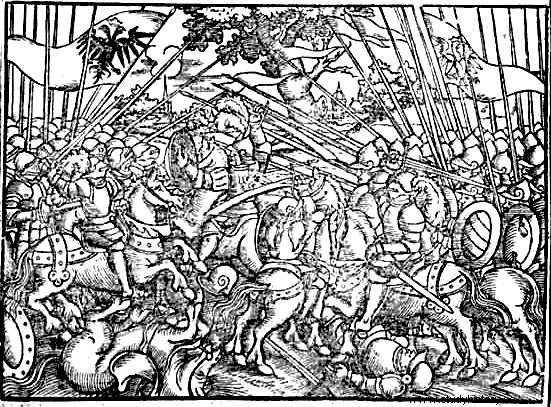
A great battle was to take place at an unspecified location and date.
When they are dead, others rush to their aid and [also] fall. And so one after another [perish], until finally almost all the troops standing behind turn [against them]. As a result, not so much the middle ones as the first ones interfere with the ranks; because they do not know the cause of the confusion, they think that their own are fleeing, not pursuing, so they [themselves] scatter almost in flight - we read about the effects of the Ślężanie maneuver in the Kadłubek chronicle.
Bolesław himself was to attack the confused royal troops. Supported by the storm of poisoned Parthian arrows (!), He smashed the enemy forces, whose miserable "remnants were collected by the sad Lemania, the emperor's life as grace, and the escape for triumph," continues Master Vincent. And as if that were not enough, a large pack of dogs devouring the corpses would appear on the bloody battlefield. From them the place was called Psie Pole.
Big fake
The hull, colorful and suggestive description of the great battle (probably somewhere in Silesia, because there are no details) must have made an impression on his contemporaries. Not only that, his vision (further colored by Długosz's arguments) has shaped the historical consciousness of Poles for hundreds of years . Especially in the face of repeated Polish-German conflicts and in the period of the Polish People's Republic, when the blade of state propaganda was directed at the Germans, always suspected of reactionism (obviously the bad ones - from the West).
Unfortunately, however, there are many indications that the size of the battle should be definitely reduced or forgotten completely . The historian Karol Olejnik emphasizes that "Bolesławiec did not use defensive tactics for this, he blocked road routes, attacked the opponent in ambushes, chased his food supply units to take the risk of a battle in the field". At the same time, some researchers do not question some victorious skirmish for the Polish side with the royal army, which in Kadłubek's case grew into a pogrom for the entire army of Henry V.
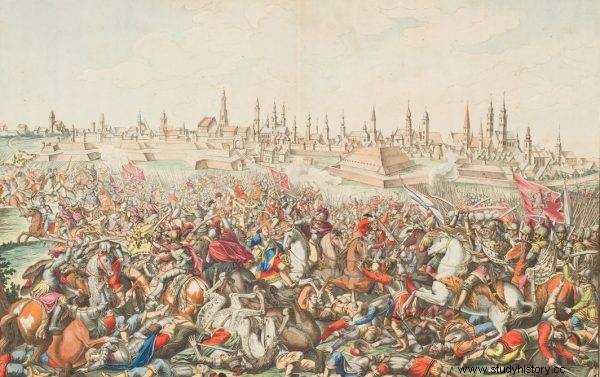
There are many indications that the size of the battle should be definitely reduced or forgotten completely
As reported by Anonymous
However, master Wincenty's reliability is a consideration for the fact that his chronicle was created almost a century after the events described, not avoiding confabulations and ancient borrowings proven by historiographers. Perhaps it was based on some local tradition that conveyed the details of a great battle. Doubts in this matter are fueled by the fact that Gall Anonymous, who reports almost live the war with the King of the Reich, does not mention the battle at all. After all, one would expect that the court chronicler of Bolesław Krzywousty would not fail to describe the victorious clash, since he was able to emphasize even the slightest success of his principal. What's more, the German sources at the time are also silent about the battle on Piast soil. And usually they did not shy away from describing even the defeated by the Teutonic side of the battle.
The question of the name of the place of the princely and royal struggle also remains unexplained. Kadłubkowa etymology is a stretch for some researchers. Yes, the existence of a settlement with that name in the times of Master Wincenty is beyond doubt. Also, the dogs wandering about the battlefield were probably not unusual . However, science looks for the root of Psie Pole, either in the prince's kennel that exists in this area, or ... in the inferior "dog" quality of the surrounding lands. As a result, King Henry could be beaten in a poor field, "only taking the corpses with him as a tribute."
Bibliography
- Gall Anonim, Polish Chronicle , crowd. R. Grodecki, Wrocław 2003.
- Cosmas Chronicle of the Czechs , crowd. M. Wojciechowska, Wrocław 2006.
- Master Wincenty Kadłubek, Polish Chronicle , crowd. B. Kürbis, Wrocław 2003.
- Olejnik K., Głogów 1109 , Warsaw 1999.
- Samp M., The strategic goal of King Henry V during the struggle with the Polish state in 1109 , "Colloquium. Education - Politics - History ”2018, No. 3.
- Samp M., From Głogów to Wrocław - an outline of the military operations of the declining phase of the Polish-German struggle of 1109 , www.infolotnicze.pl [access:8/06/2022].
- Samp M., The state of defense of the Polish western border before the outbreak of the Polish-German war in 1109 , "Opolski Quarterly" 2018, No. 2/3.
